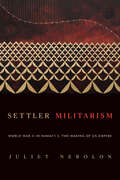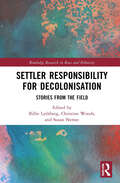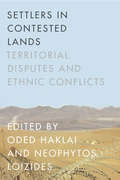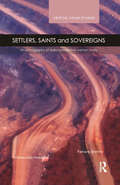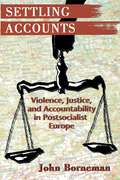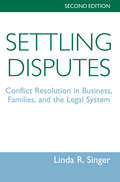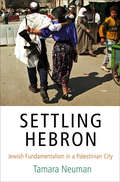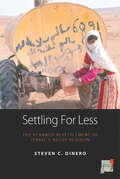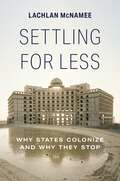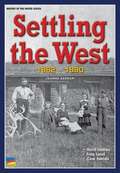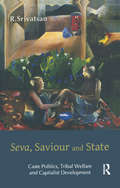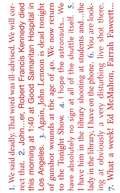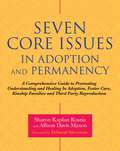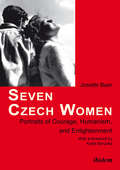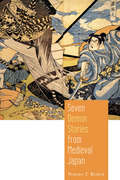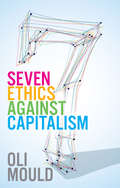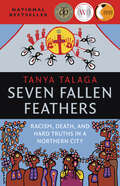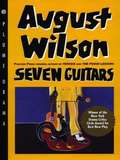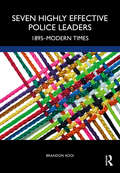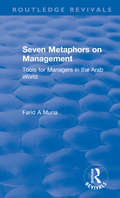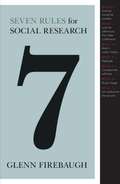- Table View
- List View
Settler Militarism: World War II in Hawai'i and the Making of US Empire
by Juliet NebolonUnder martial law during World War II, Hawaiʻi was located at the intersection of home front and war front. In Settler Militarism, Juliet Nebolon shows how settler colonialism and militarization simultaneously perpetuated, legitimated, and concealed one another in wartime Hawaiʻi for the purposes of empire building in Asia and the Pacific Islands. She demonstrates how settler militarism operated through a regime of racial liberal biopolitics that purported to protect all people in Hawaiʻi, even as it intensified the racial and colonial differentiation of Kanaka Maoli, Asian settlers, and white settlers. Nebolon identifies settler militarism’s inherent contradiction: It depends on life, labor, and land to reproduce itself, yet it avariciously consumes, via violent and extractive projects, those same lives and natural resources that it needs to subsist. From vaccination and blood bank programs to the administration of internment and prisoner-of-war camps, Nebolon reveals how settler militarism and racial liberal biopolitics operated together in the service of capitalism. Collectively, the social reproduction of these regimes created the conditions for the late-twentieth-century expansion of US military empire.
Settler Responsibility for Decolonisation: Stories from the Field (Routledge Research in Race and Ethnicity)
by Billie Lythberg Susan Nemec Christine WoodsThis edited collection presents perspectives from a range of disciplines on the challenges of dismantling coloniality in settler societies. Showcasing a variety of pedagogies and case studies, the book offers approaches to the praxis of decolonisation in diverse settings including tertiary education, activism, arts curatorial practice, the media, trans-Indigeneity, and psychosocial therapy. Chapters centre on the personal, relational, and political work needed to support decolonisation in settler societies in Aotearoa New Zealand, Australia, the United States, and Canada. Drawing from experiences in the field, contributors argue that to decolonise research and build authentic relationships with Indigenous communities, settler researchers must learn from Indigenous worldviews without appropriating them, disrupt colonial epistemologies, and reconcile their place in colonialism. Indigenising is discussed as a counterpart to the decolonisation process, involving restoring and centring the Indigenous voice within Indigenised socio-cultural, economic, legal, and political structures and institutions, including the return of land. The book is a rich resource for researchers seeking to understand and support decolonisation in settler societies, and will appeal to non-Indigenous scholars, students, and those involved in decolonisation work in community and institutional settings.
Settlers in Contested Lands: Territorial Disputes and Ethnic Conflicts
by Neophytos Loizides Oded HaklaiSettlers feature in many protracted territorial disputes and ethnic conflicts around the world. Explaining the dynamics of the politics of settlers in contested territories in several contemporary cases, this book illuminates how settler-related conflicts emerge, evolve, and are significantly more difficult to resolve than other disputes. Written by country experts, chapters consider Israel and the West Bank, Arab settlers in Kirkuk, Moroccan settlers in Western Sahara, settlers from Fascist Italy in North Africa, Turkish settlers in Cyprus, Indonesian settlers in East Timor, and Sinhalese settlers in Sri Lanka. Addressing four common topics--right-sizing the state, mobilization and violence, the framing process, and legal principles versus pragmatism--the cases taken together raise interrelated questions about the role of settlers in conflicts in contested territory. Then looking beyond the similar characteristics, these cases also illuminate key differences in levels of settler mobilization and the impact these differences can have on peace processes to help explain different outcomes of settler-related conflicts. Finally, cases investigate the causes of settler mobilization and identify relevant conflict resolution mechanisms.
Settlers, Saints and Sovereigns: An Ethnography of State Formation in Western India (Critical Asian Studies)
by Farhana IbrahimThis book is an anthropological study located along India’s western border with Pakistan. The core arguments are situated within the context of contemporary religious nationalism, communal strife, and border politics in the Indian state of Gujarat. It seeks to understand how, within these contexts, a region becomes a meaningful place for its inhabitants and how different peoples relate to locality through time. Theoretically, the book builds on available anthropological literatures on state formation and border politics to interrogate the presumed impermeability of nationalist discourse and territorial boundaries.
Settling Accounts: Violence, Justice, and Accountability in Postsocialist Europe (Princeton Studies in Culture/Power/History)
by John BornemanAs new states in the former East bloc begin to reckon with their criminal pasts in the years following a revolutionary change of regimes, a basic pattern emerges: In those states where some form of retributive justice has been publicly enacted, there has generally been much less of a recourse to collective retributive violence. In Settling Accounts, John Borneman explores the attempts by these aspiring democratic states to invoke the principles of the "rule of law" as a means of achieving retributive justice, that is, convicting wrongdoers and restoring dignity to victims of moral injuries. Democratic regimes, Borneman maintains, require a strict form of accountability that holds leaders responsible for acts of criminality. This accountability is embodied in the principles of the rule of law, and retribution is at the moral center of these principles. Drawing from his ethnographic work in the former East Germany and with select comparisons to other East-Central European states, Borneman critically examines the construction of categories of criminality. He argues against the claims that economic growth, liberal democracy, or acts of reconciliation are adequate means to legitimate the transformed East bloc states. The cycles of violence in states lacking a system of retributive justice help to support this claim. Invocation of the principles of the rule of law must be seen as a chance for a more democratic, more accountable, and less violent world.
Settling Disputes: Conflict Resolution In Business, Families, And The Legal System, Second Edition
by Linda SingerWithin the past few years, innovative methods have been developed not only to settle disputes out of court but also to supplement or replace the means by which legislatures, businesses, communities, therapists, and schools handle conflicts that once could be resolved only by litigation or force. Settling Disputes serves as an essential guide to the new settlement alternatives. This updated edition, in response to the rapid changes of the past five years, includes substantial new material that describes recent transformations in the way that courts and public agencies respond to disputes. The book discusses alternative dispute resolution from the viewpoints of potential participants and offers advice to those who are involved in disputes to help them analyze their situations and goals. Finally, it provides suggestions for professionals involved in dispute resolution and for those whose jobs in law, business, or government are affected by the new options for settling disputes.The dispute resolution movement continues to offer the most hopeful, powerful alternative to the business and personal costs of litigation or, worse, of violence. It has tremendous implications for the professional lives of Americans, for their private lives?as parents, spouses, neighbors, and consumers?and for their role as citizens.The first edition of Settling Disputes was awarded the 1990 Center for Public Resources Book Prize.
Settling Hebron: Jewish Fundamentalism in a Palestinian City (The Ethnography of Political Violence)
by Tamara NeumanThe city of Hebron is important to Jewish, Islamic, and Christian traditions as home to the Tomb of the Patriarchs, the burial site of three biblical couples: Abraham and Sarah, Isaac and Rebecca, and Jacob and Leah. Today, Hebron is one of the epicenters of the Israel-Palestine conflict, consisting of two unequal populations: a traditional Palestinian majority without citizenship, and a fundamentalist Jewish settler minority with full legal rights. Contemporary Jewish settler practices and sensibilities, legal gray zones, and ruling complicities have remade Hebron into a divided Palestinian city surrounded by a landscape of fragmented, militarized strongholds.In Settling Hebron, Tamara Neuman examines how religion functions as ideology in Hebron, with a focus on Jewish settler expansion and its close but ambivalent relationship to the Israeli state. Neuman presents the first critical ethnography of the Jewish settler populations in Kiryat Arba and the adjacent Jewish Quarter in the Old City of Hebron,considered by many Israelis as the most "ideological" of settlements. Through extensive fieldwork, interviews with settlers, soldiers, displaced Palestinian urban residents and farmers as well as archival research, Neuman challenges dismissive portraits of settlers as rigid, fanatical adherents of an anachronistic worldview. At the same time, she reveals the extent of disconnection between these settler communities and mainstream Modern Orthodox Judaism, both of which interpret written sources on the sacredness of land—biblical texts, rabbinic commentary, and mystical traditions—in radically different ways. Neuman also traces the violent results of a settler formation, Palestinian responses to settler encroachment, and the connection between ideological settlement and economic processes. Settling Hebron explores the complexity of Hebron's Jewish settler community in its own right—through its routine practices and rituals, its most extreme instances of fundamentalist revision and violence, and its strategic relationships with successive Israeli governments.
Settling Nature: The Conservation Regime in Palestine-Israel
by Irus BravermanA study of Palestine-Israel through the unexpected lens of nature conservation Settling Nature documents the widespread ecological warfare practiced by the state of Israel. Recruited to the front lines are fallow deer, gazelles, wild asses, griffon vultures, pine trees, and cows—on the Israeli side—against goats, camels, olive trees, hybrid goldfinches, and akkoub—which are affiliated with the Palestinian side. These nonhuman soldiers are all the more effective because nature camouflages their tactical deployment as such.Drawing on more than seventy interviews with Israel&’s nature officials and on observations of their work, this book examines the careful orchestration of this animated warfare by Israel&’s nature administration on both sides of the Green Line. Alongside its powerful protection of wildlife biodiversity, the territorial reach of Israel&’s nature protection is remarkable: to date, nearly 25 percent of the country&’s total land mass is assigned as a park or a reserve. Settling Nature argues that the administration of nature advances the Zionist project of Jewish settlement and the corresponding dispossession of non-Jews from this space.
Settling for Less: The Planned Resettlement of Israel's Negev Bedouin (Space and Place #3)
by Steven C. DineroThe resettlement of the Negev Bedouin (Israel) has been wrought with controversy since its inception in the 1960s. Presenting evidence from a two-decade period, the author addresses how the changes that took place over the past sixty to seventy years have served the needs and interests of the State rather than those of Bedouin community at large. While town living fostered improvements in social and economic development, numerous unintended consequences jeopardized the success of this planning initiative. As a result, the Bedouin community endured excessive hardship and rapid change, abandoning its nomadic lifestyle and traditions in response to the economic, political, and social pressure from the State—and received very little in return.
Settling for Less: Why States Colonize and Why They Stop
by Lachlan McNameeWhy countries colonize the lands of indigenous people Over the past few centuries, vast areas of the world have been violently colonized by settlers. But why did states like Australia and the United States stop settling frontier lands during the twentieth century? At the same time, why did states loudly committed to decolonization like Indonesia and China start settling the lands of such minorities as the West Papuans and Uyghurs? Settling for Less traces this bewildering historical reversal, explaining when and why indigenous peoples suffer displacement at the hands of settlers.Lachlan McNamee challenges the notion that settler colonialism can be explained by economics or racial ideologies. He tells a more complex story about state building and the conflicts of interest between indigenous peoples, states, and settlers. Drawing from a rich array of historical evidence, McNamee shows that states generally colonize frontier areas in response to security concerns. Elite schemes to populate contested frontiers with loyal settlers, however, often fail. As societies grow wealthier and cities increasingly become magnets for migration, states ultimately lose the power to settle frontier lands.Settling for Less uncovers the internal dynamics of settler colonialism and the diminishing power of colonizers in a rapidly urbanizing world. Contrasting successful and failed colonization projects in Australia, Indonesia, China, and beyond, this book demonstrates that economic development—by thwarting colonization—has proven a powerful force for indigenous self-determination.
Settling the Boom: The Sites and Subjects of Bakken Oil
by Mary E. Thomas Bruce BraunExamines how settler colonial and sexist infrastructures and narratives order a resource boom Over the past decade, new oil plays have unsettled U.S. energy landscapes and imaginaries. Settling the Boom studies how the disruptive forces of an oil boom in the northern Great Plains are contained through the extension of settler temporalities, reassertions of heteropatriarchy, and the tethering of life to the volatility of oil and its cruel optimisms.This collection reveals the results of sustained research in Williston, North Dakota, the epicenter of the &“Bakken Boom.&” While the boom brought a rapid influx of capital and workers, the book questions simple timelines of before and after. Instead, Settling the Boom demonstrates how the unsettling forces of an oil play resolve through normative narratives and material and affective infrastructures that support settler colonialism&’s violent extension and its gendered orders of time and space. Considering a wide range of evidence, from urban and regional policy, interviews with city officials, media, photography, and film, these essays analyze the ongoing material, aesthetic, and narrative ways of life and land in the Bakken.Contributors: Morgan Adamson, Macalester College; Kai Bosworth, Virginia Commonwealth U; Thomas S. Davis, Ohio State U; Jessica Lehman, Durham U.
Settling the Earth
by Clive GambleIn this worldwide survey, Clive Gamble explores the evolution of the human imagination, without which we would not have become a global species. He sets out to determine the cognitive and social basis for our imaginative capacity and traces the evidence back into deep human history. He argues that it was the imaginative ability to "go beyond" and to create societies where people lived apart yet stayed in touch that made us such effective world settlers. To make his case Gamble brings together information from a wide range of disciplines: psychology, cognitive science, archaeology, palaeoanthropology, archaeogenetics, geography, quaternary science and anthropology. He presents a novel deep history that combines the archaeological evidence for fossil hominins with the selective forces of Pleistocene climate change, engages with the archaeogeneticists' models for population dispersal and displacement, and ends with the Europeans' rediscovery of the deep history settlement of the earth.
Settling the West: 1862–1890
by Joanne Barkan Gary J. AntonettiFind out about why Americans journeyed west, the hardships they faced and the effect of westward expansion on Native Americans.
Seva, Saviour and State: Caste Politics, Tribal Welfare and Capitalist Development
by R. SrivatsanThis book provides a unique understanding of the concept and practice of seva (service) in modern India. It examines social reform, key ameliorative programmes, seva organisations, nationalist politics and colonial anthropology to show the critical linkages between caste politics, tribal welfare and capitalist development. Drawing upon archival research and field interviews, the author establishes a critical dialogue with both historiography and ethnography. Further, he explores how the works of Gandhi, Nehru, Ambedkar, Gokhale, and others functioned in the political discourses and practices of their time. This lucid and comprehensive study will interest scholars and researchers in political theory, modern Indian history, sociology and social anthropology, Dalit and tribal studies, and cultural studies.
Seven American Deaths and Disasters
by Kenneth GoldsmithIn Seven American Deaths and Disasters, Kenneth Goldsmith transcribes words used by people describing events they had never prepared themselves to witness, as they unfurl. In doing so, he reveals an extraordinarily rich linguistic panorama of passionate description. Taking its name from the Warhol paintings of the same name, Goldsmith recasts the mundane as the iconic, creating a sense of prose poems that encapsulate both the Kennedy assassinations, that of John Lennon, the Space Shuttle Challenger disaster, 9/11 and the death of Michael Jackson.
Seven Aunts
by Staci Lola DrouillardPart memoir, part cultural history, these memories of seven aunts holding home and family together tell a crucial, often overlooked story of women of the twentieth century They were German and English, Anishinaabe and French, born in the north woods and Midwestern farm country. They moved again and again, and they fought for each other when men turned mean, when money ran out, when babies—and there were so many—added more trouble but even more love. These are the aunties: Faye, who lived in California, and Lila, who lived just down the street; Doreen, who took on the bullies taunting her &“mixed-blood&” brothers and sisters; Gloria, who raised six children (no thanks to all of her &“stupid husbands&”); Betty, who left a marriage of indenture to a misogynistic southerner to find love and acceptance with a Norwegian logger; and Carol and Diane, who broke the warped molds of their own upbringing.From the fabric of these women&’s lives, Staci Lola Drouillard stitches a colorful quilt, its brightly patterned pieces as different as her aunties, yet alike in their warmth and spirit and resilience, their persistence in speaking for their generation. Seven Aunts is an inspired patchwork of memoir and reminiscence, poetry, testimony, love letters, and family lore. In this multifaceted, unconventional portrait, Drouillard summons ways of life largely lost to history, even as the possibilities created by these women live on. Unfolding against a personal view of the settler invasion of the Midwest by men who farmed and logged, fished and hunted and mined, it reveals the true heart and soul of that history: the lives of the women who held together family, home, and community—women who defied expectations and overwhelming odds to make a place in the world for the next generation.
Seven Core Issues in Adoption and Permanency: A Comprehensive Guide to Promoting Understanding and Healing In Adoption, Foster Care, Kinship Families and Third Party Reproduction
by Sharon Roszia Allison Davis MaxonBased on a hugely successful US model, the Seven Core Issues in Adoption is the first conceptual framework of its kind to offer a unifying lens that was inclusive of all individuals touched by the adoption experience. The Seven Core Issues are Loss, Rejection, Shame/Guilt, Grief, Identity, Intimacy, and Mastery/Control. The book expands the model to be inclusive of adoption and all forms of permanency: adoption, foster care, kinship care, donor insemination and surrogacy. Attachment and trauma are integrated with the Seven Core Issues model to address and normalize the additional tasks individuals and families will encounter. The book views the Seven Core Issues from a range of perspectives including: multi-racial, LGBTQ, Hispanic, Asian, Native American, African-American, International, openness, search and reunion, and others. This essential guide introduces each Core Issue, its impact on individuals, offering techniques for growth and healing.
Seven Czech Women
by Josette BaerThis engaging and insightful book is the first historical study in English portraying the lives and fates of Czech women. The seven life stories, ranging from the late 19th century to the present day, expose the often cruel political history of Bohemia (19th century), the Czech lands in Czechoslovakia (20th century), and the Czech Republic (20th-21st century) through the eyes of prominent women whose acts and deeds on behalf of their fellow citizens remain unforgotten in the Czech collective mind. The three chapters and four oral history interviews offer a captivating insight into how the situation of Czech women in society has changed during a most eventful period of history. This book has been preceded by a first volume on Slovak women (ISBN 9783838207087) whose lives have been of the same singular importance for Slovakia as their Czech counterparts were for their country. The two volumes are separate entities in their own right, but together provide the reader with a comprehensive picture of women's lives in the Czech lands and Slovakia, stressing the distinct political circumstances Czech and Slovak women have faced in recent history.
Seven Demon Stories from Medieval Japan
by Noriko ReiderIn Japanese culture, oni are ubiquitous supernatural creatures who play important roles in literature, lore, and folk belief. Characteristically ambiguous, they have been great and small, mischievous and dangerous, and ugly and beautiful over their long history. Here, author Noriko Reider presents seven oni stories from medieval Japan in full and translated for an English-speaking audience. Reider, concordant with many scholars of Japanese cultural studies, argues that to study oni is to study humanity. These tales are from an era in which many new oni stories appeared for the purpose of both entertainment and moral/religious edification and for which oni were particularly important, as they were perceived to be living entities. They reflect not only the worldview of medieval Japan but also themes that inform twenty-first-century Japanese pop and vernacular culture, including literature, manga, film, and anime. With each translation, Reider includes an introductory essay exploring the historical and cultural importance of the characters and oni manifestations within this period. Offering new insights into and interpretations of not only the stories therein but also the entire genre of Japanese ghost stories, Seven Demon Stories is a valuable companion to Reider’s 2010 volume Japanese Demon Lore. It will be of significant value to folklore scholars as well as students of Japanese culture.
Seven Ethics Against Capitalism: Towards a Planetary Commons
by Oli MouldCapitalism has become so dominant that it is difficult to ever imagine a world in which its injustices and inequalities are not violently present. In this ambitious and compelling book, Oli Mould turns his diagnosis of capitalism's perversions towards defining the new set of ethics we need to succeed in organizing a more just society. In the wake of the coronavirus pandemic, capitalism has been rocked to its foundations and 'the commons' as a means of providing for all people in our world has come crashing into the foreground. However, in order for the commons to be a viable alternative to the injustices of capitalism, it needs to be grown to a planetary scale. This is not an easy process, but if we can commit to act ethically in the world, then suddenly anything is possible. Blending theoretical thinking and real-life examples of commoning in action, Mould guides the reader through a suite of ethical mindsets – mutualism, transmaterialism, minoritarianism, decodification, slowness, failure and love – which can stand firm against capitalism's seemingly inexorable ability to co-opt and subsume all before it. When thought of collectively, these ethics can offer tantalizing visions and practical approaches towards a world beyond capitalism.
Seven Fallen Feathers: Racism, Death, and Hard Truths in a Northern City
by Tanya TalagaThe groundbreaking and multiple award-winning national bestseller work about systemic racism, education, the failure of the policing and justice systems, and Indigenous rights by Tanya Talaga.Over the span of eleven years, seven Indigenous high school students died in Thunder Bay, Ontario. They were hundreds of kilometres away from their families, forced to leave home because there was no adequate high school on their reserves. Five were found dead in the rivers surrounding Lake Superior, below a sacred Indigenous site. Using a sweeping narrative focusing on the lives of the students, award-winning author Tanya Talaga delves into the history of this northern city that has come to manifest Canada’s long struggle with human rights violations against Indigenous communities.
Seven Guitars
by August WilsonFull Length, Tragic comedy Characters: 4 male, 3 female Exterior Set The sixth in the author's decade by decade exploration of the black experience in America, two of which have won Pulitzer Prizes, Seven Guitars is part bawdy comedy, part dark elegy and part mystery. In the backyard of a Pittsburgh tenement in 1948, friends gather to mourn for a blues guitarist and singer who died just as his career was on the verge of taking off. The action that follows is a flashback to the busy week leading up to Floyd's sudden and unnatural death. "Displays a narrative sweep and almost biblical richness of language and character. . . . Mr. Wilson writes so vividly that the play seems to have the narrative scope and depth of a novel. "-The New York Times. "Impressive . . . with wild, untamed elements of symbolic fantasy, and the language . . . is used with the specific riff like fluency and emotional impact of jazz. "-New York Post. Winner of the N. Y. Drama Critics Award for Best Play.
Seven Highly Effective Police Leaders: 1895-Modern Times
by Brandon KooiThis book provides a valuable addition to the policing literature by detailing the backgrounds and histories of seven important police leaders: Teddy Roosevelt, August Vollmer, O.W. Wilson, Penny Harrington, Bill Bratton, Chuck Ramsey, and Chris Magnus. Seven Highly Effective Police Leaders teaches important history, highlighting the impact on the evolution of American policing by academia and social science. Each historical biography demonstrates the importance of each leader’s decision-making and how it continues to shape the future of U.S. law enforcement. Readers are informed about each police leader's background and how their leadership was shaped by the political and historical environments in which they led. The book is useful for educational courses in policing, American history, leadership, and strategic planning. Additionally, the general public will find this book insightful regarding contemporary mass social justice protests linked to the unique history of the United States.
Seven Metaphors on Management: Tools for Managers in the Arab World
by F. MunaThis title was first published in 2003. This text covers seven management metaphors that have been of great value to the author and his clients over the years in his roles as a father, manager and management trainer. Some chapters contain checklists or guidelines for action; others have short hypothetical case studies woven into the writing. These demonstrate either the principle ideas or how to use the metaphors as managerial tools. Many of the anecdotes and examples used in the book are drawn from the author's personal experience and consulting assignments in the West and the Arabian Gulf. The book is written with the practicing manager in mind. It contains many references to well-known publications but does not have an academic tone. In brief, the book summarizes up-to-date research findings and trends on a number of people management topics. It also describes the trends in management styles and practices in the Arabian Gulf over a period of 30 years, based on field research carried out in 1980, 1989 and 2002.
Seven Rules for Social Research
by Glenn FirebaughSeven Rules for Social Research teaches social scientists how to get the most out of their technical skills and tools, providing a resource that fully describes the strategies and concepts no researcher or student of human behavior can do without. Glenn Firebaugh provides indispensable practical guidance for anyone doing research in the social and health sciences today, whether they are undergraduate or graduate students embarking on their first major research projects or seasoned professionals seeking to incorporate new methods into their research. The rules are the basis for discussions of a broad range of issues, from choosing a research question to inferring causal relationships, and are illustrated with applications and case studies from sociology, economics, political science, and related fields. Though geared toward quantitative methods, the rules also work for qualitative research. Seven Rules for Social Research is ideal for students and researchers who want to take their technical skills to new levels of precision and insight, and for instructors who want a textbook for a second methods course. The Seven Rules There should be the possibility of surprise in social research Look for differences that make a difference, and report them. Build reality checks into your research. Replicate where possible. Compare like with like. Use panel data to study individual change and repeated cross-section data to study social change. Let method be the servant, not the master.
